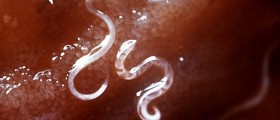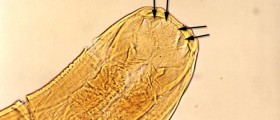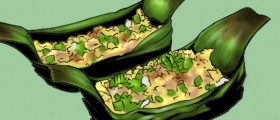
Hookworms
Hookworms, also known as roundworms, are parasites which live in small intestines. These worms are the second most frequent worms which affect people. Among numerous hookworms only two attack humans and may end up in human gastrointestinal tract. They are Necator americanum and Ancylostoma duodenale. The infection caused by Necator americanus commonly occur in North, Central and South America. It can be also found in Australia. On the other hand, Ancylostoma duodenale affects people in the Middle East, southern Europe and North Africa.
Nercator americanus may be grey or pink and its size varies from 5 to 10mm depending on the gender. These worms can live up to 15 years. Female parasites are capable to produce amazing 10.000 eggs a day. Ancylostoma duodenale looks like Nercator americanus. The only difference is that Ancylostoma duodenale lives only 6 months and female parasites can produce up to 30.000 eggs a day.
Larvae of these worms are located in warm and moist soil. They reach this soil via infected human feces. After being exposed to the infected soil a person may catch the parasite. Namely, larvae attach to the skin of a person and penetrate it. They finally enter the blood stream and end in lungs. After reaching alveoli these parasites are coughed and then swallowed and they finally settle in their natural habitat - small intestines. The entire path from penetrating the skin too finally ending in the intestines lasts approximately six weeks. Larvae become mature in several weeks and they become ready to reproduce. The eggs are passed in the stool.
In some cases of Alcylostoma duodenale larvae may reach and settle in muscles. These 'silent' larvae are not active but may induce the infection years after the initial attack.
Symptoms of Hookworms
General symptoms include fever, tiredness, loss of appetite, weight loss, and lightheadedness. While entering the body larvae can cause itchiness of the feet. After that a rash may occur.
These worms can cause anemia and protein deficiency because they 'steal' food from the host. Additionally, they may lead to constipation or diarrhea. Some people may feel nausea and vomit. Indigestion is common as well.
While they are in lungs parasites may cause dyspnea, cough and chest pain.
In people who are already having trouble with the heart there is even chance of congestive heart failure.
In children these parasites may cause improper growth and development.
Diagnosis of Hookworms
The diagnosis of hookworms can be easily set by microscopic conformation of hookworm eggs in the stool. There are certain antiparasitic medications which are given to the patients and after the treatment the stool requires another microscopic examination to confirm eradication of the parasites.












_f_280x120.jpg)




Your thoughts on this
Loading...